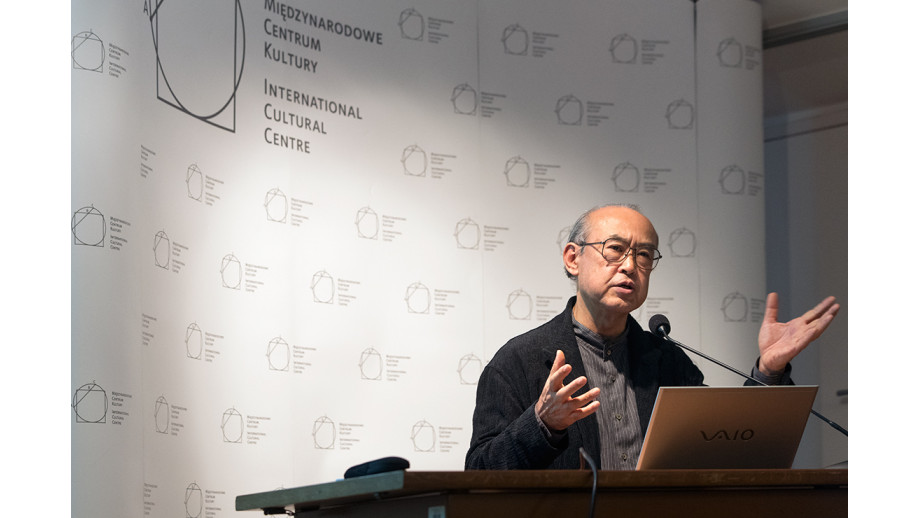News

Tokimasa Sekiguchi: 20th century Polish non-fiction is a veritable treasure of world literature
Tokimasa Sekiguchi, winner of the Transatlantyk Award for 2021, talks about, among other things, how he became interested in Polish literature, the cultural role of a translator, problems in translating from Polish into Japanese, and the pinnacle of his translation dreams.
How did your adventure with Polish culture begin, what attracted you to our literature in the first place? It seems like quite an exotic destination from a Japanese point of view.
This is the most frequently asked question and yet the most difficult one to answer responsibly. I think I still don't know very well myself how it happened, although I have tried many a time to analyse both my inner life and the external socio-historical facts and interpret them in some meaningful way. One thing is certain, it did not happen for one great reason. There were many factors, and they operated over a period of years. There were also many coincidences.
I am sorry, but I would like to refer you to the text Od japońskiego Schulza do polskiego Parnickiego (”From Japanese Schulz to Polish Parnicki”), in which, among other things, I tried to give a factual account of my earliest encounter with Polish literature and the beginnings of my studies in Polish literature. I wrote there that when I was a teenager I read Schulz and Gombrowicz, and further I wrote, "Strictly speaking, I read Japanese texts written by Yukio Kudō (1925-2008) based on Polish originals. Kudō's texts were excellent. I think Schulz's works were the best among Kudō's many translation achievements." I wanted to learn Polish and tried to reach translators of this language. At that time, there was neither a textbook nor a dictionary of the Polish language in Japan. Translator Shōzō Yoshigami advised me to buy textbooks published abroad. This is more or less how it started.
Apart from your rich output in translation, which we will discuss in a moment, you have managed, among other things, to initiate the series "Classics of Polish Literature" in Japanese. In the case of a minor language, the translator is often also a cultural ambassador. Is this how you see your role?
I am not an ambassador for Polish culture because I am not Polish. I am, at most, a Japanese importer of Polish culture to Japan, though this is not a lucrative job. If someone were to ask me why I do it since it does not bring me any income, I would answer that by making Polish culture available to the Japanese, I repay a debt of gratitude to my Polish friends who brought me up and educated me, starting from my first stay in Krakow in 1974-1976.
It is interesting, however, that what I do in Polish for Poles sometimes qualifies as the work of a Japanese ambassador... Let us take, for example, lectures on the concepts of "Asia", "haiku", Japanese nature, the Japanese translation of Bolesław Prus's Lalka (“The Doll”), or the publication of the book Not Entirely Polish Essays in Poland. In this book, I try to shed a lot of light on Japan and its culture, using the position of a bilingual comparative observer.
What is the most difficult in translation from Polish into Japanese? Cultural differences, structural differences between languages?
There are various difficulties, and each one is an obstacle as great as the others. In my text on The Doll, "Will Prus's The Doll enter world literature?", I brought up interesting examples of the issues. Some of them would not occur to Polish readers at all, such as the issue of Polish diminutives or broken Polish.
Cultural differences are probably also important.
As an anecdote, I can tell you that a Japanese woman, having read the whole novel, had no idea that Wokulski was in exile. But the proper names themselves make for difficult reading, and yet there is also the complicated historical reality of 19th-century Poland under the partitions, the whole heritage of Romanticism, and the diversity of language of the characters, showing their social status. How to render these latter differences? Nowadays, the katakana syllabary is mainly used to write proper nouns and names of foreign origin, such as Warushawa (Warsaw) or sūpu, a soup not made in the Japanese way. Japanese soup is written in hiragana, the main syllabary. So, when one reads the lines written in katakana in the translation of The Doll – for example those spoken by Jan Mincel and old Szlangbaum – the reader gets the unmistakable impression that they are dealing with a foreign accent and sentences of non-normative character, and this feeling corresponds precisely to the effect of "broken Polish". Of course, this is just one example, because there are many more of these cultural differences and translation problems.
Do you have any more translation dreams? Are there any Polish writers that you think are missing from the Japanese language?
I have long promised myself and others that I would translate all the Polish (not Latin) works of Kochanowski. I see, however, that this is no longer possible. I have too little time left. If I managed in my lifetime to translate Volume III of Fryderyk Chopin's Correspondence, which is due to be published in two years' time in Warsaw, I think we should consider it the 'pinnacle of dreams'.
Lots of Polish writers and works are missing. Słowacki, Orzeszkowa, Żeromski... I write about Orzeszkowa in my latest essay Białorusi piękna! (”Belarus of Beauty!”) in the pages of Krakow's Herito quarterly.
Besides, there are many wonderful essays, memoirs, diaries, from the 20th century alone, waiting to be translated. I believe that 20th century Polish non-fiction is a veritable treasure of world literature, still undiscovered.
Interviewer: Krzysztof Cieślik
Translated by Justyna Lowe